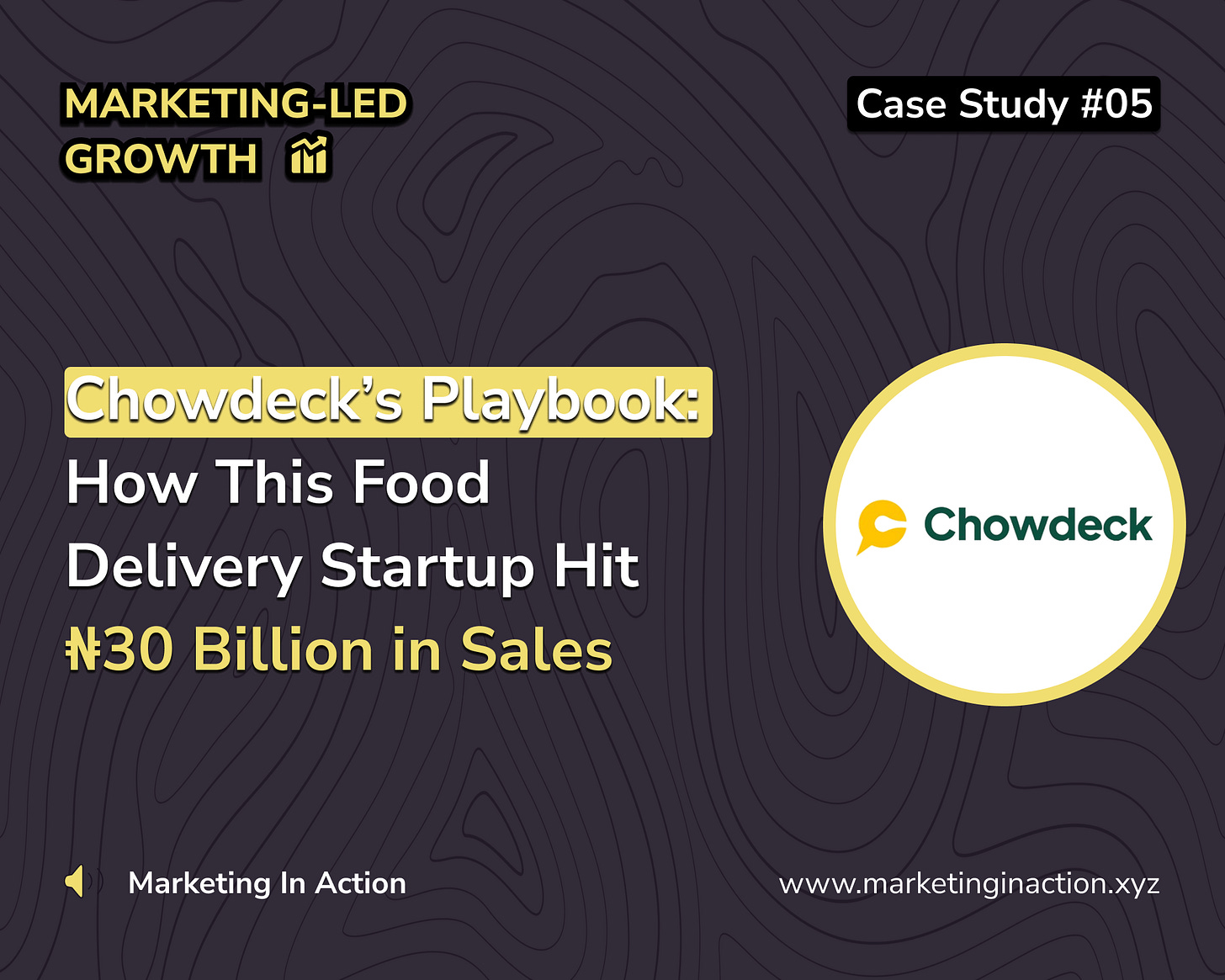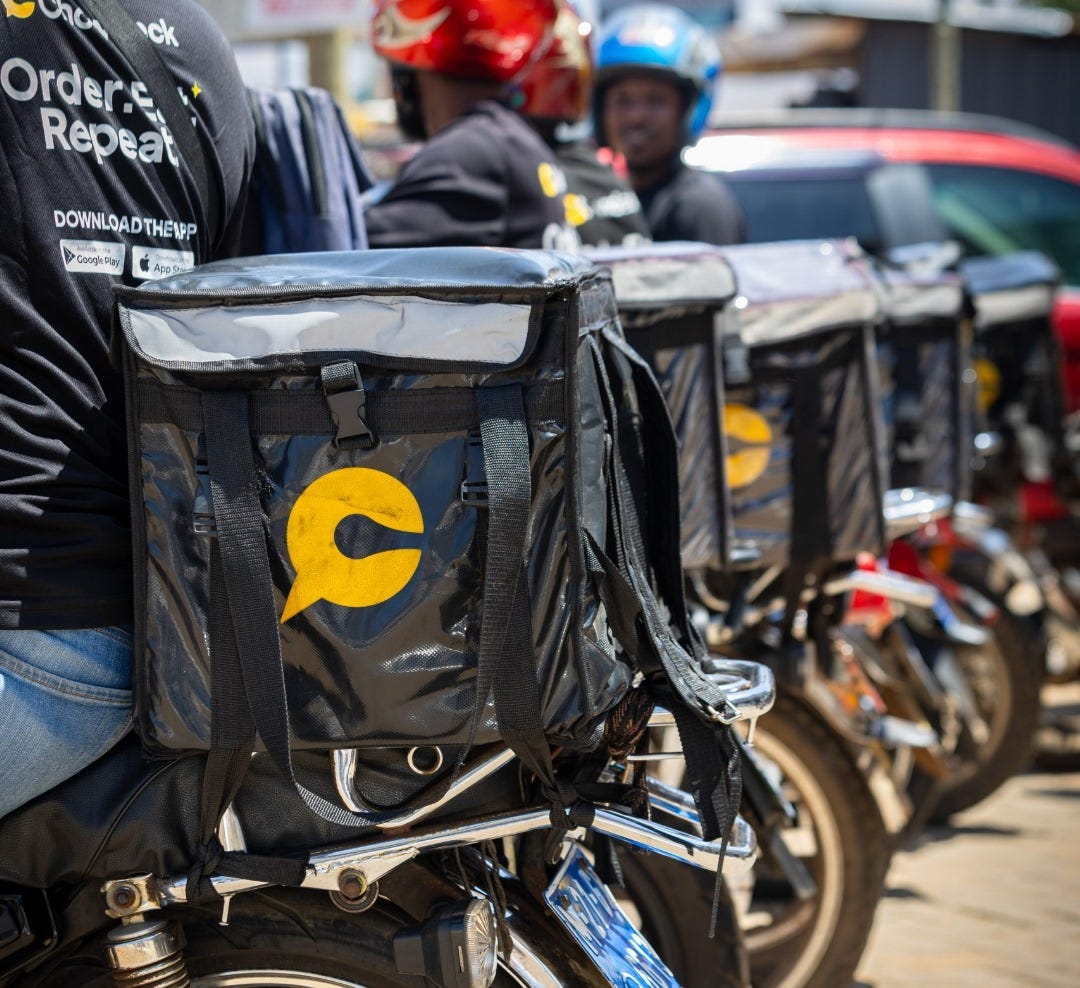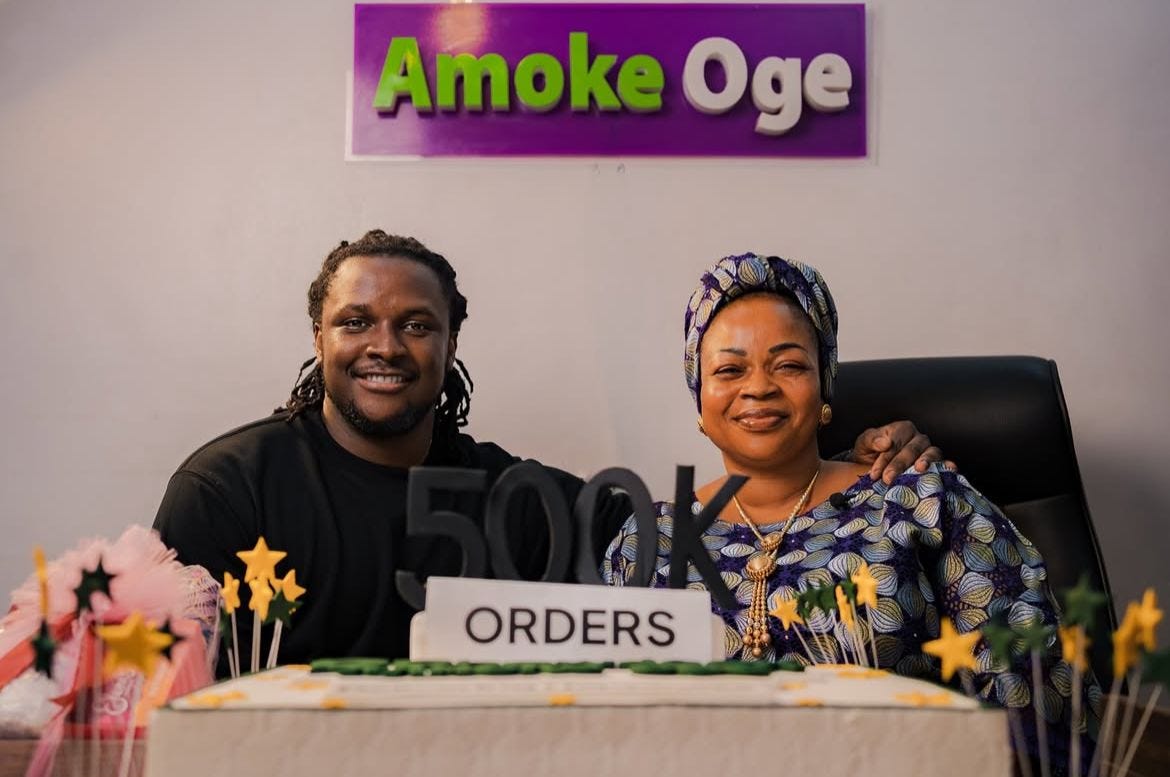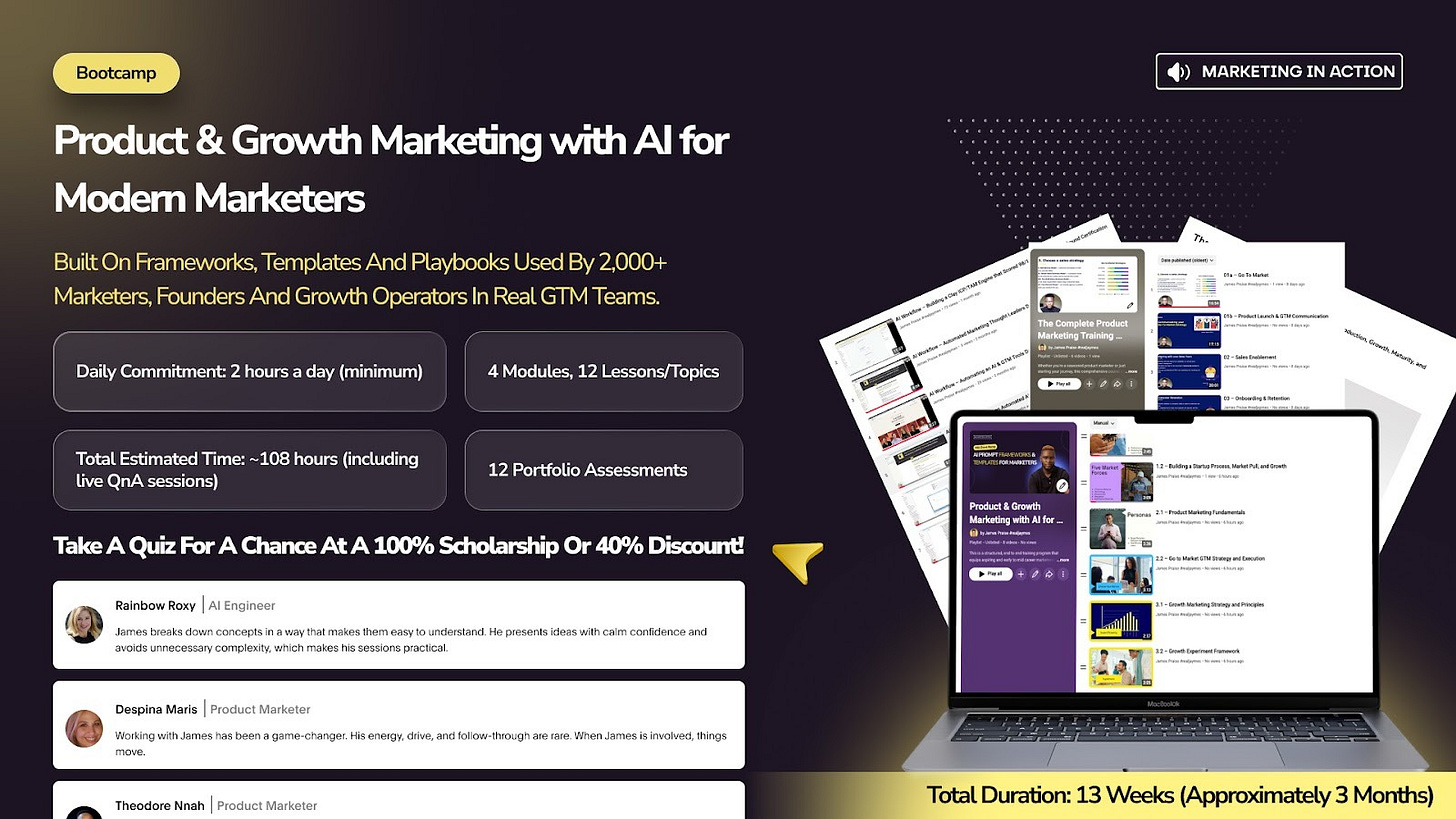Chowdeck: How This Food Delivery Startup Hit ₦30 Billion in Sales
This food delivery app lets you order from top restaurants without long wait times.
🚨 ICYMI: We’re putting together the State of Marketing in African Tech Report, covering SaaS, FinTech, Web3, Healthtech, Edtech, HRtech, Agritech, Ecommerce, Energytech, Marketplaces, Entertainment Tech, Creators, and Agencies.
If you work in these industries, please share your insights via this 5-minute survey (and receive one-year subscriber access to 50+ Product & Growth marketing templates from the MIA Resources & Template Library).
The "Why" Behind Chowdeck
Chowdeck was founded in October 2021 by Femi Aluko (CEO), Olumide Ojo (CTO), and Lanre Yusuf (COO) with a simple goal: to fix the food delivery system in Nigeria – something most people agreed was broken.
Before Chowdeck, the founders had already established their reputations in the tech industry. Femi and Ojo previously served as principal engineers at Paystack, while Yusuf was an engineering lead at Crown Interactive. But even with their backgrounds, they ran into the same frustrating experience many Nigerians face – ordering food was hit-or-miss, especially when it mattered most.
The idea for Chowdeck was inspired by Femi Aluko's personal experience during the COVID-19 pandemic. After testing positive for the virus on December 31, 2020, he found it challenging to get food delivered in Lagos, as many food delivery providers were not operational during public holidays.
At the time, most delivery platforms lacked structure. People’s orders took forever to get delivered. Sometimes, your food comes hot and on time. Sometimes, it never came at all. It became clear that there was a gap – people wanted to order food, vendors wanted to sell, and riders wanted to earn as well, but the systems connecting them were weak.
“I tested positive for COVID on the 31st of December, 2020. The result came in very late at night, and I couldn’t travel home. I spent the entire January 1 looking for food vendors to deliver food to me, but the available food delivery providers didn’t deliver during public holidays. I eventually found one after so many hours and ended up paying 4x the regular amount.” — Femi Aluko
What if they built a delivery platform that could actually handle scale? One where the tech, logistics, and experience were designed to work smoothly in Nigerian cities? This was the starting point for Chowdeck. More specifically, Femi’s firsthand experience highlighted the inefficiencies in Nigeria's food delivery system, especially during critical times.
Motivated by this, he and his co-founders embarked on a mission to create a more reliable and efficient food delivery service, leading to the birth of Chowdeck.
Building and Launching the Product
The team – Femi Aluko, along with Olumide Ojo and Lanre Yusuf began by validating the market through an MVP built quietly in 2021. They initially launched in two areas: Ikeja and Yaba, Lagos. Rather than trying to scale instantly, they focused on tightly controlling logistics, ensuring delivery times were low and customer experience was high. According to their Y Combinator launch post, Chowdeck achieved an average delivery time of under 30 minutes in its first few months.
From the start, Chowdeck worked closely with partner restaurants, many of whom had given up on food delivery altogether due to unreliable riders and poor customer service. The company not only brought orders to them, but it also restored trust in delivery as a viable revenue stream. Within months, a large percentage of Chowdeck’s early restaurant partners reported significant sales growth thanks to the platform.
To drive adoption, the team took a hands-on approach, handling everything from logistics to customer support. Particularly, the team adopted a highly operational approach, managing dispatch, tech, and customer support under one roof.
Additionally, the initial focus on a few key locations allowed them to fine-tune operations before expanding to more cities. By early 2022, the product was gaining traction, both with customers looking for reliable meals and restaurants eager for a dependable delivery partner.
Achieving Product-Market Fit
Chowdeck's journey to product-market fit was marked by strategic focus and iterative learning. Launched in October 2021, the platform began with just two restaurant partners and a handful of delivery bikes, concentrating its initial operations in Lagos to ensure quality and reliability before scaling.
The team put their energy into making sure their riders could pick up and deliver orders quickly and safely. This careful start helped build trust with both customers and vendors. Restaurants appreciated this, especially busy food vendors who saw Chowdeck as a dependable partner to reach more customers without worrying about delivery logistics.
Chowdeck’s model resonated well with both customers and restaurants. By 2024, the platform had grown significantly, recording over ₦30 billion in food deliveries and serving more than 1 million users across eight Nigerian states.
Beyond just the numbers, individual success stories helped highlight Chowdeck’s impact. Korede Alimi, owner of a fast-food chain (Korede Spag), reported that Chowdeck riders were exceptionally prompt, often picking up about 200 orders daily from a single restaurant.
Chowdeck also recently revealed that his business has generated more than ₦1 billion in sales through its platform. This milestone speaks to the power of Chowdeck’s delivery network in helping local food vendors grow their businesses.
Another food vendor in Lagos, Amoke Oge, also hit a remarkable ₦2.3 billion in sales on the platform, showing how Chowdeck is supporting a wide range of food businesses across the city.
Chowdeck’s ability to meet the needs of both hungry customers and busy vendors helped it gain strong traction in Nigeria’s competitive food delivery market. Their focus on reliable service and real partnerships with restaurants allowed them to grow steadily and become a trusted name for food delivery in Lagos and beyond.
Go-To-Market Strategy
When Chowdeck launched in October 2021, its entry into Nigeria’s food delivery market didn’t come with a splashy marketing campaign. Instead, the founders—Femi Aluko, Olumide Ojo, and Lanre Yusuf—focused on building a dependable service that solved a problem they understood intimately: late or unreliable food delivery in Nigerian cities.
In the early days, they fulfilled orders themselves, a decision that wasn’t just symbolic but foundational to understanding how orders got delayed, where bottlenecks occurred, and what customers really valued, eventually helping them develop effective solutions.
One of their earliest operational fixes was to introduce a system of order validation at restaurants, especially those with high demand. For instance, for some of their busiest vendors, a dedicated team helps verify order readiness before confirmation, reducing cancellations and building user trust.
To support this level of service, the company invested heavily in its rider network, offering riders performance incentives, housing support, and even promotion opportunities. According to the team, these incentives weren’t just generous, they were essential to ensuring reliability, a key differentiator in a market where missed deliveries are all too common.
As the company expanded, strategic partnerships became a critical growth lever. In August 2024, Chowdeck signed an exclusive deal with Chicken Republic, one of Nigeria’s most popular fast-food chains. This deal helped Chowdeck gain strong footing in Lagos and Ibadan, where demand for quick and affordable meals is high.
A few months earlier, in December 2023, Chowdeck had already ventured into grocery delivery through a partnership with Shoprite. That collaboration allowed the brand to extend beyond just meals to essential groceries, offering same-day delivery in Lagos, Ibadan, Abuja, and Port Harcourt.
In terms of technology and customer access, Chowdeck made deliberate choices to ensure inclusivity. The app was designed to work seamlessly in low-bandwidth environments and was integrated with mobile money platforms to allow easy, cashless payments.
For users with limited digital access, Chowdeck even offered order placements via phone – a rare but thoughtful touch in an increasingly app-first world. They also introduced budget-friendly options, like N1,000 meal deals, to appeal to price-conscious consumers without compromising quality. Campaigns like these, including the Chicken Republic deal, became major drivers of new user acquisition and repeat purchases.
Chowdeck’s marketing strategy was equally intentional. Rather than burning cash on ads, they built virality into the user experience, especially during moments that mattered. Customers frequently shared screenshots of fast delivery times and personalized service on social media, building organic visibility. The team later layered on paid advertising efforts as the business scaled, with data from Startup Graveyard Africa revealing that they began increasing ad spend proportionally with growth, focusing on cities with rising order volumes and adjusting creatives based on customer behavior.
Together, these choices, grounded in operational execution, thoughtful expansion, user empathy, and measured promotion, helped Chowdeck establish not just a brand but a service people could actually rely on. In a market long plagued by delivery delays and disappearing riders, that reliability became its most powerful form of marketing.
👉🏽 Join the Marketing In Action WhatsApp Community where MIA Newsletter subscribers network, and gossip (what’s trending).
User Base and Revenue
Since its inception in October 2021, Chowdeck has rapidly emerged as a formidable force in Nigeria's food delivery landscape. By 2024, the platform had surpassed ₦30 billion in total deliveries, marking a significant milestone in its growth trajectory. This achievement was accompanied by a rapidly-growing user base, which expanded from just 319 users in its first month to over one million registered users by the end of 2024.
Chowdeck's operational footprint extends across eight major Nigerian cities, including Lagos, Abuja, Ibadan, and Port Harcourt. The company collaborates with over 3,000 businesses and maintains a fleet of more than 10,000 riders, ensuring efficient and timely deliveries. These riders are compensated competitively, with earnings comparable to senior civil servants, reflecting Chowdeck's commitment to fair labor practices.
The platform's revenue model is multifaceted. Beyond the standard delivery fees, Chowdeck generates income through restaurant commissions, service charges, and occasional surge fees. This diversified approach allows the company to offer competitive prices to customers while ensuring profitability.
In addition to its core food delivery services, Chowdeck has ventured into the advertising space. The company offers various advertising options, including banner ads on its app, push notifications, and branded delivery bags. These advertising avenues have become increasingly popular among brands seeking to reach Chowdeck's extensive user base, further bolstering the company's revenue streams.
Chowdeck's impressive growth and innovative strategies have positioned it as a key player in Nigeria's evolving food delivery and logistics sector. With plans for further expansion and diversification, the company is poised to continue its upward trajectory in the coming years.
Fundraising Efforts
In April 2024, Chowdeck secured $2.5 million in seed funding to enhance its operations and support expansion into more Nigerian cities. The funding round attracted a diverse group of investors, including Y Combinator, Goodwater Capital, FounderX Ventures, Hoaq Fund, Levare Ventures, True Culture Funds, and Haleakala Ventures. Notable angel investors such as Simon Borrero and Juan Pablo Ortega (co-founders of Rappi), Shola Akinlade and Ezra Olubi (co-founders of Paystack), Sudeep Ramnani (Sportybet), Ayo Arikawe (Thrive Agric), and Karthik Ramakrishnan (Amazon) also participated in the round.
The capital infusion was strategically aimed at consolidating Chowdeck's market leadership in its existing eight cities, Lagos, Abuja, Ibadan, Port Harcourt, Ilorin, Benin City, Abeokuta, and Asaba, and laying the groundwork for further expansion across Nigeria. The company planned to utilize the funds to optimize its delivery operations, enhance user experience, and strengthen partnerships with vendors and riders.
CEO and co-founder Femi Aluko emphasized the company's commitment to delivering excellent experiences for customers, vendors, and riders. He stated,
"We know that Nigerians love good food, and we just want to make it as easy as possible for them to access the food they desire. Chowdeck was birthed to fulfill this purpose, and we are committed to delivering truly excellent experiences for our customers, vendors, and riders".
The successful seed funding round marked a significant milestone for Chowdeck, providing the necessary resources to scale its operations and reinforce its position in Nigeria's competitive food delivery market.
What’s Next for Chowdeck in 2025?
Chowdeck is growing fast, and 2025 is shaping up to be a big year. In January, the team launched in Kaduna and Owerri. By March, they took a bold step by opening in Accra, Ghana – Chowdeck’s first move outside Nigeria.
To keep up with the growth, the company has made some changes to how it runs. One major step was cutting back on manual tasks and improving the flow of deliveries. These changes helped reduce delivery times from around 41 minutes to just 33. It also meant letting go of some contract staff so the company could move faster and work smarter.
In Ghana, Chowdeck is training riders to improve delivery quality and also launched reward programs to keep customers happy. The goal is to create a strong and reliable experience for everyone using the platform.
Chowdeck is also looking to go beyond meals. They’re planning to add more services like grocery and pharmacy deliveries, so people can order other everyday needs straight to their doorstep. The long-term dream is to become a one-stop app for anything you need quickly, starting with food, but not stopping there.
With the right moves, growing demand, and solid improvements behind the scenes, Chowdeck is set to keep expanding in 2025, faster, smarter, and more useful than ever.
We recommend Chowdeck if you’re looking for a reliable food delivery service to satisfy your cravings without chasing dispatch riders.
🎓 Learn how marketing actually drives growth, then do the work.
Join the 13-week, execution-first bootcamp where growth stories are translated into practical skills used by 2,000+ marketers across product marketing, growth, lifecycle, performance, and applied AI by shipping real work, not watching theory.
If you want to collaborate or feature your product in this newsletter, check out our media kit, and shoot me an email.
We’re building a village of 5,000+ marketers and founders who want to increase their odds of succeeding at marketing. Share this newsletter with them.



















I enjoyed reading this. I can't believe Chowdeck was founded in 2021. Kudos to the team 🙌🏽 👏🏽
this is so detailed! Welldone